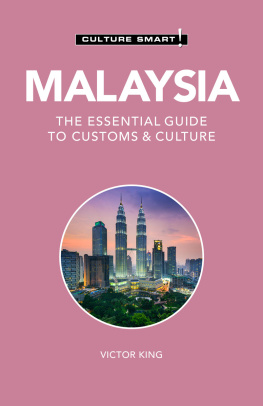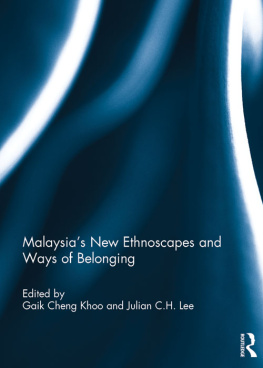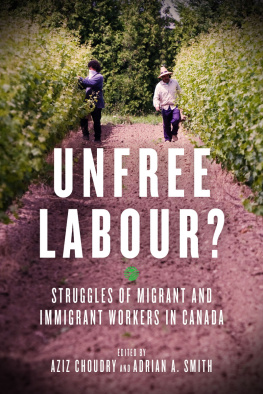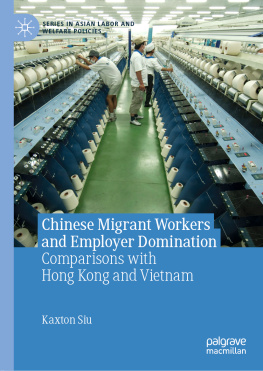2022 by the Board of Trustees of the University of Illinois
All rights reserved
Library of Congress Cataloging-in-Publication Data
Names: Tran, Angie Ngoc, author.
Title: Ethnic dissent and empowerment: economic migration between Vietnam and Malaysia / Angie Ngoc Tran.
Description: Urbana, Chicago: University of Illinois Press, [2021] | Series: Studies of world migrations | Includes bibliographical references and index.
Identifiers: LCCN 2021038168 (print) | LCCN 2021038169 (ebook) | ISBN 9780252043369 (cloth) | ISBN 9780252085277 (paperback) | ISBN 9780252052248 (ebook)
Subjects: LCSH: Foreign workers, VietnameseMalaysia.
Classification: LCC HD8700.6 .T74 2021 (print) | LCC HD8700.6 (ebook) | DDC 331.6/2595dc23
LC record available at https://lccn.loc.gov/2021038168
LC ebook record available at https://lccn.loc.gov/2021038169
To my parents, ng Trn Quang Phong and B Don Th Qu, for their unconditional love and support of my own transnational migration in bringing this project to completion
Acknowledgments
This book confirms my passionate interest in labor migration studies and my transnational fieldwork, which started in 2008 and spans several countries: Vietnam, Malaysia, Cambodia, Poland, and the Czech Republic. The more fieldwork I did, the more I learned about the richness of different ethnic groups, dispelling the narrative that Vietnamese migrants are a monolithic group. The kindness of the migrant workers and their families from the five ethnic groups who shared with me their trials and tribulations, their strategies of dissent, their success stories and optimism, kept me going even during the most arduous field trips and strengthened my commitment to shedding light on their plight and to improving their condition.
I am very grateful to many individuals in Vietnam (many of whose names I cannot mention to preserve their confidentiality) who shared with me their knowledge, sources, and time (some even accompanied me on field trips spanning over ten years). Dr. Hunh Th Ngc Tuyt, historian and social work professor, has been a role model for me owing to her strong commitment to the cause of workers and her support for fellow researchers and activists for social justice. She introduced me to Mr. Trn Vn Thnh at a state-owned recruitment company, who supplied the context and history of the labor export policy and its implementation in Vietnam and allowed me to interview my first group of migrant returnees to Vietnam. These initial interviews were crucial because they gave me a way to contact the migrant workers who were still in Malaysia so I could expand my sample further. Trn Hoi, at the time a PhD student at the Max Planck Institute for Social Anthropology, supplied me with contacts that connected me with the Hr in Ngha Hnh district (Qung Ngi) and allowed me to explore the state resettlement policy. Nguyn Th Mai Thy, from the International Labour Organization, has been very helpful in updating me on labor migration rights issues and sharing her quarterly reports on the Greater Mekong Subregion TRIANGLE project.
Vietnamese store owners and families in Warsaw and Prague offered me their hospitality and insights from socialist migrant perspectives. My Vietnam-based research assistants from the Social Science Institute in the Southern Region (Vietnam) not only helped me interview dozens of people but also transcribed hundreds of hours of conversations. My dear colleague and friend Dr. Nguyn-v Thu-Hng, a professor at UCLA, has been a constant source of support, advice, and ideas. There were many individuals from the Hr, Chm, and Khmer communities who translated for me during my interviews in their villages and communes over the years. To them, I owe a great debt of gratitude.
The role of labor newspapers is very important in understanding the labor export policy and the plight of migrant workers overseas. Im very grateful to journalists Mr. Duy Quc of Ngi Lao ng (Laborer) and Mr. Nam Dng and Ms. L Tuyt of Lao ng (Labor), who shared knowledge, sources, and their own investigative news articles. Mr. Duy Quc himself conducted fieldwork in Malaysia in order to write his articles.
Two fellowships enabled me to stay in situ to do my fieldwork in Malaysia and Vietnam: the 2007 Senior Visiting Fellowship at the Centre for Asia Pacific Social Transformation Studies, University of Wollongong NSW, Australia, and the 2008 Lee Kong Chian Distinguished Fellowship on Southeast Asia, a joint appointment by Stanford University and National University of Singapore. Stanford Universitys Shorenstein Southeast Asia Program also created a venue for me to present and publish my earlier works on labor migration. Dr. Donald Emmerson at Stanford facilitated the Singapore connection that assisted this book project. Dr. Vicki Crinis (University of Wollongong) and Dr. Adrian Vickers (University of Sydney) created a wonderful collegial environment for me before I started my fieldwork in Malaysia, on which Vicki Crinis joined me. Dr. Lian Kwen Fee and Dr. Md Mizanur Rahman invited me to present a paper for the conference The Road Less Travelled: Mobility in Southeast Asian Societies in Brunei, where I received excellent feedback on the agency and migration patterns of the Chm Muslim who moved between Vietnam and Malaysia.
My analysis has been strengthened thanks to comments, questions, and suggestions from the global conferences, seminars, workshops, and brownbag talks at which I presented my work in progress. Wonderful global collegiality and fellowship over the years has enabled me to bring this book to fruition, proudly from a primarily teaching public university. I have received many constructive questions, comments, and feedback from my presentations (in English and Vietnamese) at worldwide conferences and workshops organized by the Institute of Asian Studies, the Universiti Brunei Darussalam (Brunei); the Gender and Society Research Center of Hoa Sen University, Ho Chi Minh City; the sixth Engaging with Vietnam: An Interdisciplinary Dialogue conference, jointly organized by the University of Oregon and the University of Hawaii at Manoa; the Association for Asian Studiesin Asia (AAS-in-Asia) Conference at Doshisha University in Kyoto, Japan; the Department of Politics and Economics at Chiang Mai University in Thailand; the Vietnam Update 2008 conference at the Australian National University; and the Vin khoa hc x hi vng nam b (The Southern Institute of Social Sciences) in Vietnam. In particular, Dr. Benedict J. Tria Kerkvliet, emeritus professor at the Australian National University, made excellent comments as a discussant on my presentation at the Engaging with Vietnam conference. Dr. Naomi Hosoda of Kyoto University in Japan, who was a discussant for our panel at AAS-in-Asia, introduced me to Abraham and van Schendels work on the extralegal aspect of third spaces, which led to my passion for using the third space idea as my conceptual framework.







